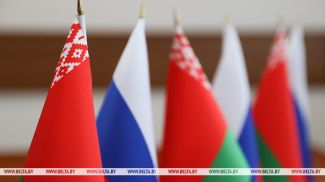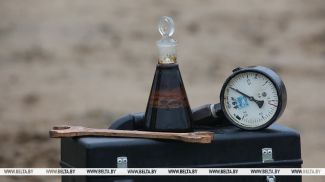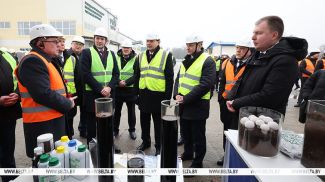MINSK, 23 August (BelTA) – The ability of the digital import substitution platform of the Belarusian Universal Commodity Exchange (BUCE) to offset negative consequences of the sanctions-fuelled pressure, diversify export, and step up manufacturing cooperation was presented during the annual business forum International Business Days in Ryazan Oblast for the first time. The forum is taking place in the Russian city of Ryazan on 23-24 August and is believed to be one of the most prominent and most important events in the region's economic life, BUCE Press Secretary Roman Yaniv told BelTA.
First Deputy Chairman of the Board of the Belarusian Universal Commodity Exchange Eduard Belsky noted during the forum's plenary session that although BUCE's import substitution platform was launched less than three months ago, it has already become a daily tool for many Belarusian enterprises. Besides, Russian companies have been increasingly active recently. They use the platform to supply import substitutes to Belarus and act as buyers, too.
The universal nature of the platform allows using it for buying substitutes for the materials, equipment, and components affected by the sanctions and for expanding the geography of sales of one's own products since nearly 6,000 non-residents from 69 countries are accredited as traders by the Belarusian Universal Commodity Exchange. It is probable that representatives of the Russian private sector are attracted by it. For them the Belarusian Universal Commodity Exchange offers an additional sale channel and an additional method to insure against foreign trade risks. It is manifested in steady growth of the number and volumes of transit deals. Russia is a leader among other foreign participants in this regard, Eduard Belsky said.
Agribusiness can become another potential area for increasing exchange trade between Belarus and Ryazan Oblast. According to the BUCE representative, both sides have something to offer to each other in this regard.
Wet blue hides and a number of other agricultural goods are already sold to Ryazan Oblast via the Belarusian Universal Commodity Exchange. Taking into account colossal export capabilities of the Belarusian agribusiness sector the choice of goods should be definitely expanded, Eduard Belsky noted. For instance, Belarus could sell cheese, butter, and other dairy products. In turn, Russian agricultural producers could supply Belarusian companies with seeds of oil-bearing and cereal crops. The Belarusian Universal Commodity Exchange handles a lot of trade in these seeds. “In other words, let's look for contact points and interact,” the executive said.
The public joint-stock company (OAO) Belarusian Universal Commodity Exchange was established in 2004. The first trade sessions took place in June 2005. BUCE is one of the largest mercantile exchanges in Eastern Europe. Its key function is to assist Belarusian companies with exporting their products and assist foreign companies with entering the Belarusian market. The commodity exchange facilitates trade in metals, timber, agricultural products, and a broad choice of industrial and consumer goods.













